Celebrating Jewish Culture in Krakow
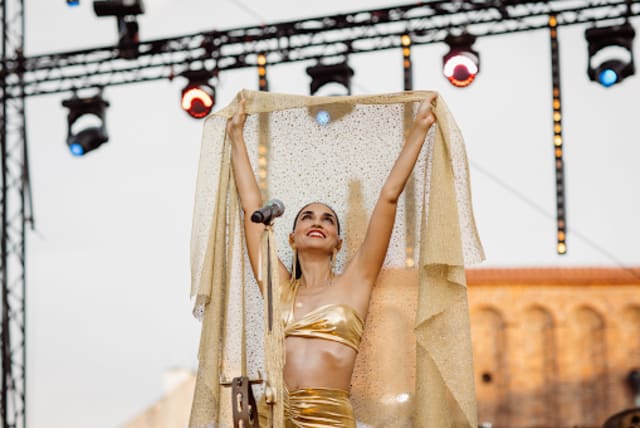
The renowned "Jewish Culture Festival" in Krakow concluded in early July, marking its 32nd year as one of the largest, highest-quality, and most respected Jewish festivals in the world. Established in the aftermath of the Holocaust and the end of the communist era in Eastern Europe, the festival has become a cherished tradition, attracting thousands of visitors from Poland and around the globe each summer.
The festival's founder and driving force, Janusz Makuch, proudly declares himself a Zionist and dedicates his life to the educational mission of reviving Jewish presence in Poland through cultural initiatives. Despite BDS and other forms of anti-Semitism, Makuch remains committed to inviting musicians and artists from Israel to the festival, emphasizing the importance of cultural exchange and dialogue.
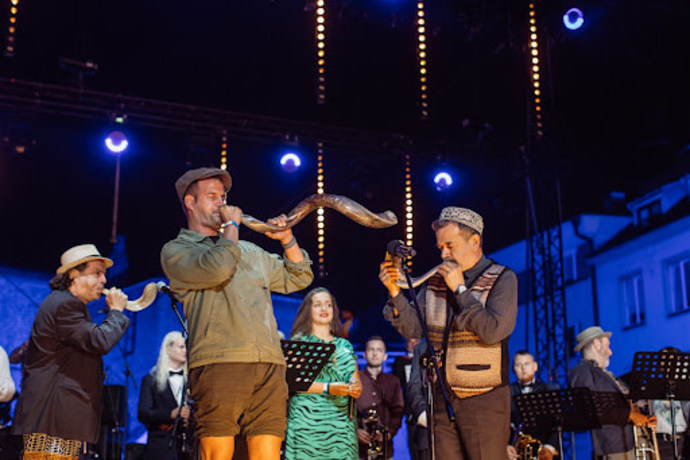
From Israel, this year's festival featured performances by Liraz Charchi, Shay Tzabari, Neta Elkayam, Kutiman, Boom Pam and the Piyot Ensemble, a multi-generational group of 18 talented musicians and performers. Their repertoire showcased Jewish sacred poetry in Hebrew and Arabic, representing the diverse cultural heritage of Jews from North Africa and the Middle East. The week-long festival reached its climax with a six-hour concert, featuring klezmer and Ashkenazi chants, Mizrahi piyutim, and original Israeli music. The concert was filmed and will be broadcast on the second Polish channel.
Janusz Makuch, a charismatic figure who proudly waved the Israeli flag alongside his older grandson Bartek at the start of the show, captivated the audience with his inspiring presence. Makuch, deeply connected to Jewish life in pre-Holocaust Krakow, shared stories and anecdotes, demonstrating the essence of Jewish culture and history. His wife, Marysha (Maria), the daughter of a Holocaust rescuer – "He just did what his heart told him to do" – is a respected book translator in Poland, further underscoring the couple's dedication to preserving and promoting Jewish heritage.
The festival has played a pivotal role in revitalizing the Kazimierz neighborhood, once the spiritual and cultural hub of Krakow's Jewish community from the 15th century until World War II. "During the communist period we were taught that all the victims of Auschwitz were Polish citizens," he says. "No one mentioned the Jews." Makuch spent a lot of time in the Kazimierz. 58,000 Krakow Jews, most of whom were residents of the neighborhood, (out of 60,000) were murdered in the early 1940s by the Germans and after the Holocaust, the area became an abandoned ghost town and a dangerous area populated by prostitutes, drunks, and the homeless.
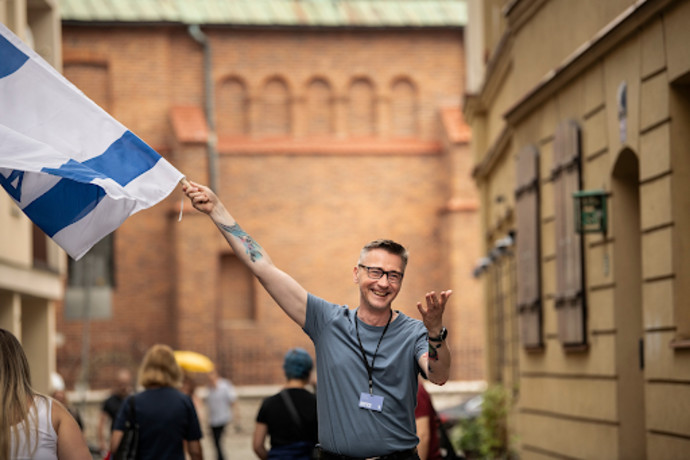
Makuch was determined to bring back the joy of Jewish life to the neighborhood and in 1988, in the shadow of the communist regime in Poland, decided to organize a Jewish festival in the neighborhood. "I felt that the six years of the Holocaust could not overshadow 1,000 years of vibrant Jewish life in Poland – a life with enormous cultural wealth that left its mark on Poland in general and Krakow in particular," he says.
Makuch's determination to restore the vibrancy of Jewish life led to the inaugural Jewish Culture Festival in 1988. Although the initial event had around 100 participants, subsequent years saw tremendous growth, particularly after the fall of the Berlin Wall and the disintegration of the Soviet Union.
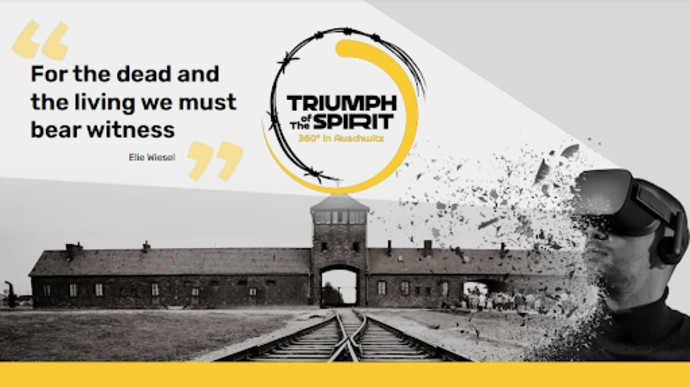
Thanks to the festival, the Kazimierz neighborhood has experienced a revival and is now regarded as one of Krakow's most vibrant areas. Makuch's early visits to Israel to invite Israeli musicians added new flavors to the festival, attracting international attention year after year. Over the years Makoch invited many musicians from the country, including Shlomo Bar and the Natural Selection Band, David D'Or, Kutiman and also Chava Alberstein, the Israeli musician and composer, who was born in Poland. She ho performed a particularly moving concert in the "Temple" synagogue, the only synagogue that was completely preserved throughout the war, because it was used as a horse stable for the Nazi Germans. Makuch: "It is a non-stop educational process aimed at a systematic mental change of Poles, as well as Jews and people of good will." Undoubtedly, the location of the festival, near the Krakow ghetto and the Auschwitz-Birkenau, Balzac, and Plaszow death camps, gives a sense of deep and grim meaning to the festival's events, but at the same time, despite the inevitable encounter with the events of the Holocaust, Makoch insists that the festival is not only about in the past but also serves as a source of inspiration for the future.
Each year, the festival culminates at Szeroka Square in a grand closing show, where all the participating musicians perform on a specially constructed stage for 6 hours in the heart of the Jewish neighborhood.
The festival celebrates the richness of Jewish culture through a diverse range of music, including contemporary Israeli, klezmer, jazz, Hasidic, Moroccan, and Bukharan music. The atmosphere is joyous, with the audience happily jumping and dancing, transcending language barriers to connect through the universal language of music. Makuch believes that the festival is an educational tool that strengthens the bond between Jewish life and contemporary Jewish culture in Israel, ensuring a close connection between Krakow and the Jewish community.
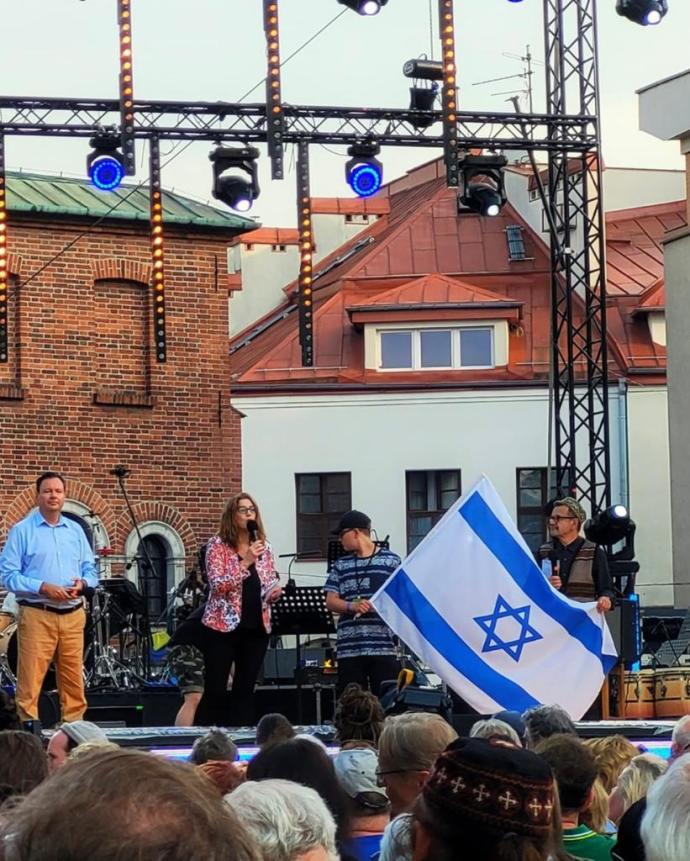
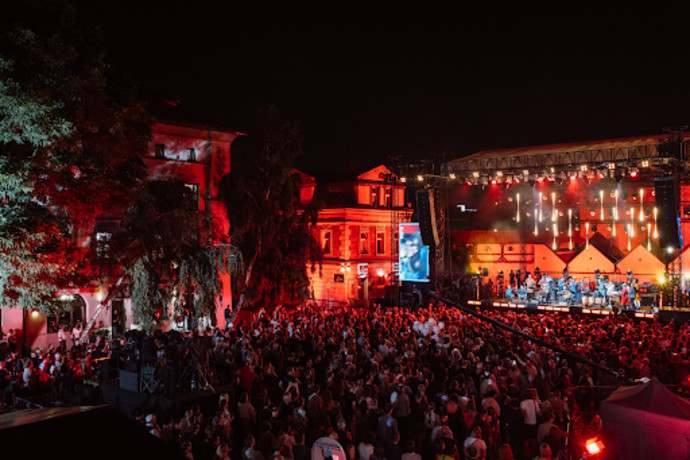
“Actually," says Makoch, "you can say it's an Israeli festival because for me, the center of Jewish life and contemporary Jewish culture is in Israel." He explains that for this reason, the Jewish Festival in Krakow maintains a close relationship with the Israeli Embassy in Poland. Dr Yaakov Livna, Israel's ambassador to Poland, said on stage: "I am excited to participate in the largest Jewish festival in Europe. This is another victory for the preservation of Jewish heritage and culture in Poland. We at the embassy will continue to encourage interest in our culture and friendship and support for Israel."
The Israeli Foreign Ministry has provided financial assistance for the festival and this year, on the occasion of the country's 75th anniversary celebrations, they increased their support. Nurit Tinari, Head of the Cultural Diplomacy Division at the Ministry of Foreign Affairs, received applause from the audience as she welcomed the festival-goers. She stated, "For us, Poland is not just another country in the world and it will never be like that. Poland flows in our blood, and therefore, we will not allow politics to come between us. You, the Poles, are our brothers and sisters for over 1,000 years."
Makuch is sure that such statements strengthen the ties between Poland and Israel.
In addition to musical performances, the festival includes hundreds of events every year: Israeli food workshops, lectures, discussions, guided tours In the Jewish neighborhood and in the area where the ghetto was and screenings of Israeli films ( "Cinema Sabaya,” "The Concerned Citizen," and more).
Also, this year at the festival the Israeli project "Victory of the Spirit" was shown for the first time - JVR360.co.il. The project, created by three Ultra-Orthodox female entrepreneurs from Israel, which allows you to virtually tour the Auschwitz-Birkenau camp for about an hour, using 3D glasses, received great interest throughout the days of the festival.
A group of about 60 young volunteers, known as the "Machers," funded by the European Union, consisting of Muslims, Christians, Hindus, and Jews, walked around the crowd and enthusiastically assisted the festival organizers.

